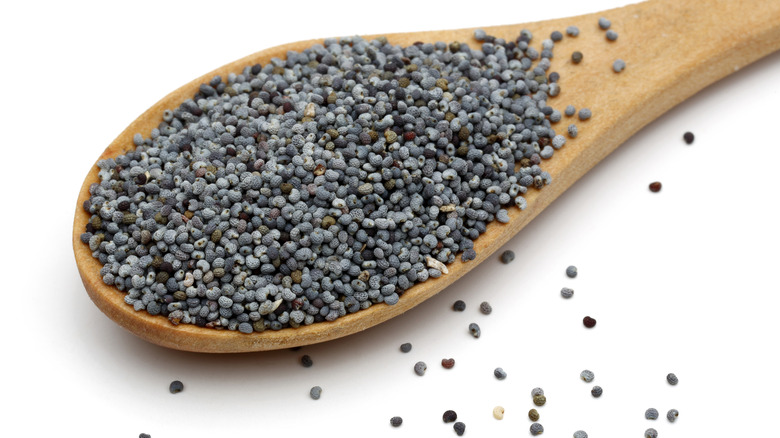The Reason Poppy Seeds Are Beloved Across Eastern Europe
When we think of Eastern European cuisine, poppy seeds don't exactly jump to mind. It's far more likely to conjure images of pierogis, pickled vegetables, and potato pancakes, but the unassuming poppy seed shows its tiny little self in a number of traditional dishes, from bialys to poppy seed rolls.
In America, poppy seeds give color, crunch, and a subtle nutty flavor to muffins, scones, and salad dressings (not to mention being a vital ingredient in everything bagel seasoning) and for these reasons, you may keep a small jar or package of them in your spice cabinet. The seeds do the same in Eastern European cuisine, but they are much more than a flavor enhancer.
In many countries and cultures around the world, certain foods hold symbolic meanings. For example, the foods served on a Seder plate at a traditional Passover meal symbolize the long history and hardships of the Jewish people, and several dishes served during Chinese New Year illustrate things like long life (noodles), prosperity (jiǎozi dumplings), and good luck (tangerines). The same concept goes for poppy seeds in Eastern Europe. Harvested from the dried seed pods of poppy flowers, these little oilseeds pack a symbolic punch to many Europeans.
Poppyseeds are highly symbolic in Eastern Europe
Although its borders are not officially set, Eastern Europe is often used to include the countries of Belarus, Bulgaria, the Czech Republic, Hungary, Moldova, Poland, Romania, Slovakia, Ukraine, and the western part of Russia. The cuisine in this part of the world is known for its hearty, filling nature, as the citizens have historically endured long, cold winters on modest budgets. The region as a whole is celebrated for ingredients that show up in many dishes, including paprika, caraway seeds, dill, and, of course, poppy seeds.
From noodle dishes to sweet pastries, the tiny, black, minuscule orbs are sprinkled on or poured out in abundance in Eastern Europe, and for good reason. Poppy seeds represent wealth, prosperity, and a bright future in Eastern Europe. For example, the Polish serve the poppy seed-stuffed cake, Makowiec, at Christmas, to bring good luck. While the Hungarian mákos guba, a sweet dish similar to bread pudding, is made with a generous amount of poppy seeds, vanilla, and milk. It is enjoyed at the end of the year in hopes of bringing luck and fortune to the new year. In fact, the Hungarian word for poppy is "mák" can also mean "luck." When the dishes sound this good and they could bring money and positivity into your life, is there any reason not to give them a try?

